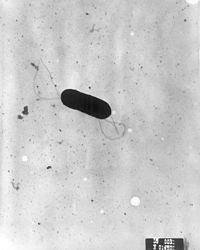
Photo from wikipedia
L. monocytogenes, consisting of 13 serotypes, is an opportunistic food-borne pathogen that causes different host reactions depending on its serotypes. In this study, highly toxic L. monocytogenes 10403s resulted in… Click to show full abstract
L. monocytogenes, consisting of 13 serotypes, is an opportunistic food-borne pathogen that causes different host reactions depending on its serotypes. In this study, highly toxic L. monocytogenes 10403s resulted in more severe infections and lower survival rates. Additionally, to investigate the remodeling of the host proteome by strains exhibiting differential toxicity, the cellular protein responses of intestinal organoids were analyzed using tandem mass tag (TMT) labeling and high-performance liquid chromatography–mass spectrometry. The virulent strain 10403s caused 102 up-regulated and 52 down-regulated proteins, while the low virulent strain M7 caused 188 up-regulated and 25 down-regulated proteins. Based on the analysis of gene ontology (GO) and KEGG databases, the expressions of differential proteins in organoids infected by L. monocytogenes 10403s (virulent strain) or M7 (low virulent strain) were involved in regulating essential processes such as the biological metabolism, the energy metabolism, and immune system processes. The results showed that the immune system process, as the primary host defense response to L. monocytogenes, comprised five pathways, including ECM–receptor interaction, the complement and coagulation cascades, HIF-1, ferroptosis, and NOD-like receptor signaling pathways. As for the L. monocytogenes 10403s vs. M7 group, the expression of differential proteins was involved in two pathways: systemic lupus erythematosus and transcriptional mis-regulation in cancer. All in all, these results revealed that L. monocytogenes strains with different toxicity induced similar biological functions and immune responses while having different regulations on differential proteins in the pathway.
Journal Title: International Journal of Molecular Sciences
Year Published: 2022
Link to full text (if available)
Share on Social Media: Sign Up to like & get
recommendations!